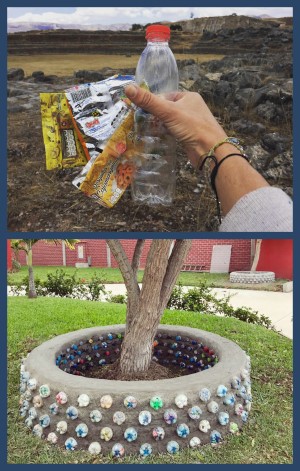
International Impact
Students support Peruvian nonprofits through virtual internships

Amazon wildlife through its
“Salva tu Selva” initiative.
Isabella Contessi ’22 preserved parts of the Amazon rain forest. Miguel Garcia ’24 provided surfing and muay thai lessons to at-risk Peruvian youth. And Julia MacIsaac ’23 promoted public works projects in and around Lima made from ecoladrillos, innovative “bricks” made of recycled plastic.
That Bentley students are supporting South American communities is remarkable in its own right. Even more impressive? They’re doing it from their dorm rooms.
When COVID-19 brought international travel to a standstill, colleges and universities around the globe were forced to reconsider their study abroad options. With fully immersive, in-person programs no longer viable, the Cronin Office of International Education worked hard to develop alternatives for Bentley students.
In January, the office introduced Global Impact Internships, six-week long virtual work experiences with nonprofits based in Peru. Offered in partnership with Emzingo, a social enterprise that strives to “prepare responsible leaders for responsible businesses,” the online internships provide an opportunity for students to hone their consulting skills while earning academic credit. Advised by Management professor Iris Berdrow, eight Bentley undergraduates worked with students from other universities this spring to support community-based organizations looking to grow their social and environmental programs.
For Contessi, a double major in Business Economics and Liberal Studies: Global Perspectives, being paired with a nonprofit partner was “a breath of fresh air.” By helping these groups better meet their financial and program goals, she says, “we’re creating a ripple effect that can positively impact hundreds of people in the long run.”

youth in underserved neighborhoods.
Contessi worked with We Can Be Heroes, an environmental conservation organization looking to enhance its “Salva tu Selva” (“Save your Jungle”) initiative. Like many other nonprofits, the group faced budget shortfalls resulting from the pandemic’s toll on the global economy.
To help, Contessi and her team members identified alternative funding sources, including corporate and foundation grants. The students researched prospective donors, establishing a robust database of international prospects, and created Spanish and English versions of a grant template the group could use to apply for funding now and in the future.
Funding was also a priority for Alto Perú, a nonprofit that provides surfing and muay thai (Thai boxing) lessons for youth living in disadvantaged neighborhoods, and Ecoladrillos Perú, an organization that transforms waste from single-use plastics into “ecobricks” used to build park benches, planters and even housing.
Students also identified ways to increase awareness of each group and its mission. For example, after discovering that nearly a third of the $450 billion in charitable donations made by North Americans in 2019 supported organizations on other continents, Garcia’s team developed a social media marketing plan aimed at American and Canadian audiences. MacIsaac’s team advised a similar approach for Ecoladrillos Perú, as well as partnering with local schools and businesses to recruit volunteers for its projects.


with recycled plastic (top) to create
tree planters and other projects.
MacIsaac, a Global Management major and Nonprofit Organizations minor, notes that, while the virtual format is not without challenges — scheduling team meetings for members scattered across five different time zones chief among them — the internships proved “super interesting and eye-opening.” Conversations with nonprofit partners “helped us understand the political and economic realities facing Peruvians,” she says, while activities arranged by Emzingo, including Spanish language lessons and a ceviche-making session with Peruvian chefs fighting food insecurity, provided additional cultural insights.
Such cross-cultural learning, Berdrow says, is invaluable. “In today’s increasingly global economy, it’s critical for business leaders to understand and respect differences in cultural values, beliefs and attitudes,” and be capable of navigating practical challenges like language barriers and technological disparities.
Berdrow was “blown away” by what the students achieved in just six short weeks. “Their business plans were thoughtful, useful and immediately applicable, and they treated their project partners and each other with professionalism and respect.” Above all, she was impressed by their passion: “The students really put their hearts into this.”
Natalie Schlegel MBA ’08, director of International Education, is similarly proud of the Bentley students’ success. “These internships prove that travel is just one component of a comprehensive global classroom.” She notes that, for students unable to participate in traditional study abroad experiences — due to cost concerns, conflicts with athletic schedules, lack of parental permission or other reasons — online options provide an alternate path to personal and professional growth.
“Our Global Impact Internships demonstrate that virtual opportunities can deliver powerful hands-on learning experiences,” Schlegel says. The program will run again during the summer trimester and “has great potential to become a permanent part of the International Education portfolio.”

